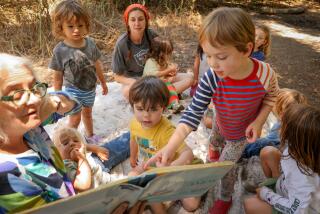Summer Camp Gets Serious, but Fun Is Still the Objective
When most of us think of summer camp, we tend to think of children paddling canoes, hiking, running three-legged races or singing by a campfire.
These days, however, summer camp is likely to be much more focused--on an academic subject, perhaps, or a specific sport, or on nutrition and weight control.
Southland camps cover a range of specialized interests, including computer literacy, languages, basketball, tennis and journalism, to name a few.
Most of these camps emphasize hands-on experience, with a minimum of book learning, and involve recreational activities for a healthy balance of academics and fun.
With so many kinds of summer camps available, finding the right one may seem bewildering. But a little research can help you give your son or daughter a summer camp experience from which he or she can emerge refreshed, more sociable and smarter.
First, find out what your options are by gathering a list of the camps in your area. Detailed ads are all over many parenting magazines, but for the fastest look at the biggest variety, browse through the “Los Angeles Times Guide to Summer Camps.”
Next, think about what kind of camp would benefit your child most. Could you and the child feel comfortable with him or her away from home at a resident camp? And for how long? Only you and the child know whether it’s the right time for such a separation.
If the answer is no, then turn your attention to day camps.
Decide whether you want an all-boys, all-girls, or coeducational camp. If your child attends a single-sex school during the year, a co-ed camp may provide a needed lesson in interacting with the other sex. Some parents, though, may feel that a mixed group can be distracting or even intimidating.
Determine what you want your child to do and learn at camp, suggests Karen Vinje, director of More Than Music Inc., a fine-arts day camp. “What is it that a child would really benefit from in a summer program? What have they done in the past and what would you like to expose them to?”
Whatever focus you and the child seek, make sure the camp isn’t all fun or all academics. “If (parents) do either of the extremes, the children get bored because they don’t want to do one activity the whole time,” said Nasrin Behravesh, founder of Les Enfants, a foreign-language day camp.
Cost may also be a factor. After asking the program’s total price, “Take it down to an hourly level,” Vinje recommended. “What are you paying per hour and what are you getting for it? You see what your money buys then.”
Also ask if the camp offers scholarships or a sliding-fee scale.
If you’re considering a resident camp, make sure it is accredited by the American Camping Assn. (ACA), said Matt Storey, senior program director for the Westside YMCA. “(The ACA) confirms that you have a good program in place and that the facilities will be up to the right kinds of requirements, such as bathroom facilities and some health and safety issues,” he explained.
What about the camp’s staff? How well educated are they in the academic subjects? Do the recreation counselors know first aid?
The counselor-student ratio is crucial, too, especially for safety during sports. “For a resident camp, you’re looking for a 1-to-8 ratio,” said Storey. “For a day camp program, one (teacher) for eight to 12 (kids) is considered a good ratio.”
Look at the camp’s day-to-day schedule of activities to see that there is a variety and that the day is properly paced. Three hours of swimming, for example, may be too much, and 20 minutes on a computer may be too little.
Once you’ve narrowed your choices, ask the camp directors to put you in touch with parents of past campers to hear their views of the programs.
Finally, if possible, visit the camp with your child to see how safe and organized it is, the cleanliness of the facilities, and whether the supervisors are alert and the children are happy.
For one to four free copies of the “L.A. Times Guide to Summer Camps” send your address and $1 for postage and handling to: L.A. Times, Reader Service Management Department, P.O. Box 5085, Pittsfield, Mass. 01203-5085.
More to Read
Sign up for Essential California
The most important California stories and recommendations in your inbox every morning.
You may occasionally receive promotional content from the Los Angeles Times.










